#technically not victorian era yet
Text
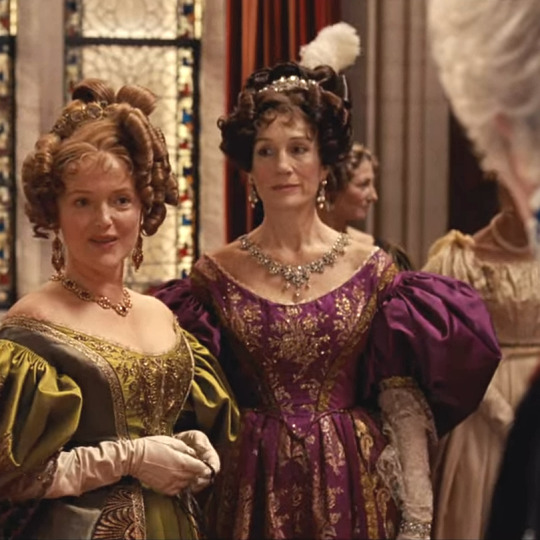

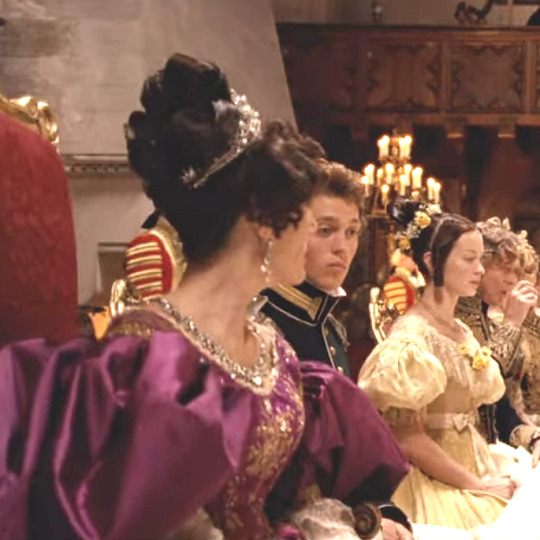

One Dress a Day Challenge
May: Purple Redux
The Young Victoria / Harriet Walter as Queen Adelaide
There are so many wonderful gowns in the "king's birthday" sequence! I've already featured Victoria's yellow dress and the Duchess of Kent's green one in previous entries. Fittingly, the queen's purple gown is the fanciest of them all, with the long train and lavish golden embroidery covering the underskirt.
The lower part of the sleeve, beneath the giant puff, appears to be lace, possibly in pink or pale lavender, over a white base. (See detail below.)
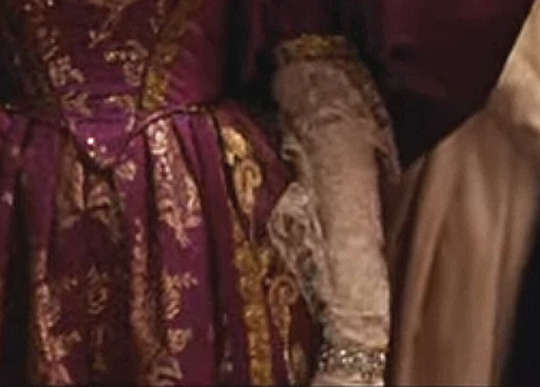
#the young victoria#purple dress#harriet walter#purple dresses#one dress a day challenge#one dress a week challenge#movie costumes#period film#sandy powell#2009 movies#2009 films#1830s style#1830s fashion#19th century costumes#19th century fashion#victorian era#victorian style#victorian costume#victorian fashion#technically not victorian era yet#purple redux
46 notes
·
View notes
Photo

Here have more Victorian Lesbians: characters from my novel project, Tilly and Gerry. Gerry’s patting Tilly on the head (sorry for bad quality- that’s Gerry’s hand). The filters were added because the original photo quality was not very good. Also why not make it pink?
#yes they're both butch#and from my nanowrimo#I'm still adding to it even now but I'm not doing the official word count any more since it's December now#I wrote a scene that was 2.4k words#it's the first time Tilly meets Hess and technically the first time Gerry's in the novel but Tilly doesn't know her yet#this was originally a green ink pen on like egg shell colored paper before I put the filters on it#nanowrimo#nanowrimo 2022#Tilly: The Progress of a Victorian Lesbian and a Female Husband#victorian lesbians#victorian era#lesbian characters#my drawing#writeblr#my chatter#lesbian writer#yeah I like Gerry a lot#and they're on my current icon#my drawings#character sketches#this would be from later in the story because this is 32 year old Tilly and 35 year old Gerry#wlw#sapphic#lesbian pride#b. h. avondale
1 note
·
View note
Text
Why Mr. Rochester and Bertha Mason Couldn't Get a Legal Separation; or, the Utter Madness of Marital Laws
So I saw a Jane Eyre post discussing why Mr. Rochester and Bertha Mason couldn't get a legal marital separation. I've thought a lot about this topic, and in order to procrastinate writing the final for my upper-level Brontë class, I've decided to write this sort of convoluted analysis instead. I know many others have written about this subject, but I wanted to explore a bit further on my own.
Preliminary context about me, the Brontës, their Byronic inspiration, etc.: I've learned a lot about 19th century British marriage laws recently in my classes on old British literature, as well as by having studied Byron, whose marital separation in 1816 was a notorious part of his history & also reverberated through 19c literature. He refers to this separation in many of his works, most famously in his notorious poem "Fare Thee Well." Harriet Beecher Stowe, the most famous American female writer at the time, was friends with Lady Byron and wrote a book defending her called "Lady Byron Vindicated: A history of the Byron controversy from its beginning in 1816 to the present time" (the original callout post).
Insanity accusations did factor in to Byron's separation. Many scholars have remarked how the Queens of Byronic Criticism, the Brontë sisters, took significant inspiration from their well-worn copy of Moore's biography Life of Byron when creating their works. The Brontës would have been very familiar with marriage laws not only due to their knowledge of Byron's trainwreck of a marriage, but also due to being well-educated women at the time who knew that marriage was the most important economic decision of one's life and could very well make or break a person. As a result, marriage plays a significant role in their novels.
More relevant preliminary context about the novel: Jane Eyre actually takes place in the Georgian era, despite most adaptations and anaysis presenting is as a Victorian piece due to the novels publication date (this drives me crazy; same goes for the other Brontë books). Marriage laws did not change drastically from the time the novel is set to the time Brontë was writing the novel, but things were a bit different socially. Rochester was also married 15 years before his attempt to marry Jane. According to this very good analysis, Rochester and Bertha probably married in or around the year 1793: https://jane-eyre.guidesite.co.uk/timeline.
Now, here are the reasons why Rochester couldn't separate from Bertha:
1) Insanity wasn't grounds for divorce/separation in the Regency era.
Rochester himself says that he couldn't legally separate from her because of her insanity, which presumably rendered any of her faults null on the grounds of that marital vow "in sickness and in health." This is possibly one of his biggest reasons:
"I was rich enough now – yet poor to hideous indigence: a nature the most gross, impure, depraved I ever saw, was associated with mine, and called by the law and by society a part of me. And I could not rid myself of it by any legal procedings: for the doctors now discovered that my wife was mad — her excesses had prematurely developed the germs of insanity [..]"
2) Divorce was nearly impossible anyway.
There had only been around 300 divorces in English history at the time. Almost all of them were husbands divorcing their wives for committing adultery. Only a handful of divorces had succesfully been obtained by women, and they were only in cases where the husband had committed incestuous adultery or bigamy, and was extremely physically cruel. So technically after his bigamy attempt, Bertha may have had more grounds to obtain a divorce than Rochester would have, if only she were lucid enough to do so. However, in that scenario infertility would have helped their case, and Adèle's existence would have harmed their case if he attempted to seek a divorce before marrying Jane. Though as the novel explains, Adèle is probably not his, she definitely would have been used against him, as would the fact that he kept Bertha's existence a secret in England. But he wouldn't have tried for divorce that late in the game anyway, considering it was one of the most difficult options.
3) Female adultery was your best bet at divorce or separation, and this probably wasn't applicable to Mr. & Mrs. Rochester.
Although some scholars claim that there is subtext hinting that Bertha was adulterous (which some adaptations, like the 2006, include), you needed substantial proof of the adultery, which Rochester may not have had if it did occur. Being a proud man, he also wouldn't have wanted to be humiliated in that way by letting it be publicly known (as shame is one of his main reasons for hiding their marriage to begin with).
However, I lean toward the idea that Bertha may not have committed adultery. If she definitively did, seeing how affected Rochester was by Céline cheating on him (he shot her lover in revenge and left her with a stipend), if he ever suspected adultery on Bertha's part then I'm sure he would have been at court the very next day. I also think Rochester tries not to be too much of a hypocrite, and he is well aware that he himself is an adulterer, so he probably doesn't want to accuse Bertha of a crime he's committed and which he couldn't definitively prove she did.
Rochester does talk about hating Bertha's "vices" when they lived together, citing drinking, arguing, cruelty to servants, cursing, her being "unchaste," a "harlot," etc. - the last epithets, combined with her supposed lack of morality, and her being described as seductive, heavily imply that adultery could be added to her list of offenses. However, if she did truly cheat on him as well, I don't see why he wouldn't plainly tell this to Jane as well. I would imagine it would be his first complaint, and it would probably be considered his most justifiable reason against her by their cultural standards.
I don't see why he wouldn't jump to take Bertha's infidelity as an opportunity to defend his own actions, considering how open he is with Jane about his own adultery and being cheated on by Cèline Varens. While I can see how some of the textual evidence may strongly suggest Bertha's adultery, we cannot be fully certain, and that may be because Rochester himself is not fully certain. I cannot see why he wouldn't have sought legal advice on that account alone.
In short, if Bertha was an adulterer, there must have been no evidence to convict her.
Also: while the double-standard may seem odd and trivial to us, the reason why female adultery held more weight than male adultery has entirely to due with old patriarchal inheritance laws; i.e the risk of a wife getting extramaritally pregnant and passing the illegitimate child off as her husband's heir was considered too great of an affront. A man could have as many bastards as he wanted because he would know they were bastards and were not at risk of inheriting his stuff. One needed legitimate heirs to justify passing on one's ancestral wealth to. Essentially, marriage was a mere economic tool, and the economy was and is inherently patriarchal. I digress.
4) Rochester's lack of social & economic leverage, and risk of social ruin in general.
Only the wealthiest of the wealthy could obtain divorce or official separation, and it often led to social ruin. Rochester is rich, but he has no title and no great network of supporters due to being a younger son and having been abroad for most of the past 15 years (this was the length of his marriage to Bertha, stated by Mr. Briggs during the bigamous wedding attempt). He doesn't have as much leverage as Lord and Lady Byron had.
To continue on official separation, like Lady and Lord Byron obtained. Just like divorce, this was also a messy and scandalous legal proceeding, and required numerous good reasons to obtain, and being well-connected Lords and Ladies really helped your case. You also needed many witnesses and written statements as evidence. Bertha's family, as we see with Mason, would have been unhelpful to Rochester, and due to his shame and secrecy, no one could really testify on his behalf I'm assuming.
5) Unofficial separation would have been inconvenient, especially in regards to living situations.
Aside from divorce, which was extremely rare, extremely controversial, and only for the wealthiest members of society — there were unofficial and official separations. An unofficial separation was simply living apart from one another. I've often wondered why Rochester didn't simply move Grace Poole and Bertha somewhere else, but my main theory is that it would have been cost ineffective, and due to his family who were implied to be shitty, he probably really didn't want to live at Thornfield anyway so thought it would be convenient to place her there. Rochester says it would be dangerous to place her in his other residence of Ferndean:
"[..] though I possess an old house, Ferndean Manor, even more retired and hidden than this, where I could have lodged her safely enough, had not a scruple about the unhealthiness of the situation, in the heart of a wood, made my conscience recoil from the arrangement. Probably those damp walls would soon have eased me of her charge: but to each villain his own vice; and mine is not a tendency to indirect assassination, even of what I most hate."
6) Annulment was likely impossible given their circumstances.
Annulment means evaporating the marriage, acting as if it never existed, that it was a mistake. This was rare and only granted in unique circumstances, and I believe it was more common with aristocracy and royals. I believe you could possibly get an annulment if you could prove that the spouse was insane at the time of the wedding and you did not know. However, Bertha did not begin to truly deteriorate until after they had been living together for a bit. And while Rochester says that he did not know her mother was in an asylum until after the wedding, having an insane mother doesn't mean that you are insane, which Bertha clearly wasn't at that point, at least not in a way that people would have publicly acknowledged, since Rochester says she attended parties and her hand was highly sought after.
Generally, the longer a marriage had gone on, the harder it was to prove why it could not go on. Rochester says that he and Bertha "lived together" for "four years" in Jamaica while her condition deteriorated and he tried to make things work. And again, after the wedding he found out her mother was "mad, and shut up in a lunatic asylum." So we have more reasons for Rochester's difficulty: the fear of Bertha going to an asylum while she was still mostly lucid in those first four years, combined with the fact that they openly lived together and certainly must have consummated their marriage (things which would further prevent annulment), and were certainly publicly recognized as a couple in Spanish Town society, and her family wanting the marriage to continue so she could have children of "good race" i.e. to produce heirs.
Here's an important passage that to me suggests that Rochester and Bertha not only had an initial flirtation but likely consummated their marriage, likely had a passionate sexual relationship for some time, and likely implies his feelings for her were more complex than we'd initially assume, making annulment not so clear-cut of an option to him at the time:
"My father said nothing about her money; but he told me Miss Mason was the boast of Spanish Town for her beauty: and this was no lie. I found her a fine woman, in the style of Blanche Ingram; tall, dark, and majestic. Her family wished to secure me because I was of a good race; and so did she. They showed her to me in parties, splendidly dressed. I seldom saw her alone, and had very little private conversation with her. She flattered me, and lavishly displayed for my pleasure her charms and accomplishments. All the men in her circle seemed to admire her and envy me. I was dazzled, stimulated: my senses were excited; and being ignorant, raw, and inexperienced, I thought I loved her. There is no folly so besotted that the idiotic rivalries of society, the prurience, the rashness, the blindness of youth, will not hurry a man to its commission. Her relatives encouraged me; competitors piqued me; she allured me: a marriage was achieved almost before I knew where I was. Oh, I have no respect for myself when I think of that act! — an agony of inward contempt masters me. I never loved, I never esteemed, I did not even know her."
7) Spousal abandonment wasn't possible, and on some level he honored his legal and financial obligations to her and the Mason family.
Bertha's family likely refused to house her for legal and personal reasons, and spousal abandonment was forbidden due to the husband's financial responsibility as well as the law of coverture (a wife became her husband's full legal responsibility; some say "property"). Like we see in Anne's Tenant of Wildfell Hall, if a woman ran away from their spouse they would have to live in obscurity and be at risk of being sussed out. You couldn't just abandon your partner. Still, people did, because it was the easiest route to take.
But the more upper-class you were, and the more financial entanglements you had, the more inconvenient this was. We know that Rochester and his family became enmeshed with the Mason family, and he got a lot of money from Bertha, so her father likely would have taken him to court. At any rate, Rochester was legally bound to bring Bertha with him to England when he left Jamaica. If he attempted to abandon her in Jamaica, the backlash it would have brought would have brought him social ruin and foiled his chances at getting away with any bigamy attempts.
All this brings us to a further notice of Bertha's family situation. Based on Charlotte Brontë's positive comments about Rochester's character (https://www.tumblr.com/burningvelvet/731403104856195072/in-a-letter-to-w-s-williams-14-august-1848) I see no reason to suspect him, like many feminist critics do, of being an unreliable narrator or of lying about Bertha Mason's history. Everyone is entitled to their opinions, and in mine, that is simply not the novel Charlotte wrote. By her own admission, she wanted his narrative to be a path to further goodness.
It makes no narrative sense for our explanation of his and Bertha's history to be full of lies when he's trying to make ammends with Jane, who never suspects him of lying during his admission, but who does critique him and figure he'd tire of her like she was one of his many mistresses. Jane wonders if Rochester would lock her in an attic too, which he refutes on the basis that he loves her more than he loved Bertha when she was sane, and so he would care for Jane himself. Jane also tells him that it's not Bertha's fault that she's mad. So in my opinion, if Charlotte wanted us to believe Rochester was lying about his and Bertha's history to make himself look better or Bertha look worse, I don't see why she would have been vague about it, and I don't see why Jane wouldn't have called it out like she does everything else. I don't think Rochester is really a villain who locked his harmless wife in the attic for giggles; I think he weighed most of his options and found, like most people back then and even today, that keeping his problems locked up and ignored was the best solution.
Now, on with the point. I have often wondered why Rochester didn't simply "unofficially separate" from Bertha by leaving her with her family when he left. Why did he take her to England? Why didn't he just run away? It wasn't because he was an evil villain who wanted to keep her as a trophy. It's because 1) I don't think her father would have let him, as he was so quick to marry her off, 2) he felt obligated to her, and 3) it was criminal for men to abandon their wives, and it would have attracted publicity, which is what Rochester was avoiding by taking Bertha to England and sheltering her in secrecy.
Many claim that Rochester's adultery is a betrayal of his wife; and while religiously, narratively, socially, we can accept this statement, it was not legally a crime. While Rochester does honor his financial and legal obligations to his wife and her family, he does not take the religious part of the vows into account, and that's why he's cosmically punished and only rewarded after he repents, as he explains toward the end of the novel.
Another interesting point is that when Rochester recounts his decision to move back to England, he tells us that Bertha had already been declared insane in Jamaica and that she was already confined there (presumably around the 4 year anniversary before they left), meaning her father probably knew about confinement:
"One night I had been awakened by her yells (since the medical men had pronounced her mad, she had of course been shut up) — it was a fiery West Indian night; [..]"
Locking away "insane" people was standard procedure then, and if this was done with Bertha's father's knowledge, considering he locked his own wife away in an asylum, then this further absolves Rochester of a lot of the blame in my opinion. It more than likely wasn't his idea to lock her away, but the advice of "the medical men" and presumably her father's consultation as well.
8) Even if he divorced or separated from her, he couldn't remarry. Attempting these, or getting caught attempting abandonment, would have brought negative publicity that would have likely prevented the success of any future bigamy attempts. To him, secrecy and bigamy seemed better chances at securing happiness than the social ruin and likely failure the other options would have brought him.
Aside from Rochester's own explanation (which I supplied in #2 re: the separation veto inherent to Bertha's insanity), the other biggest reason as to why Rochester wouldn't seek a separation/divorce even if she hadn't been declared insane and even if he were willing to accuse her of adultery truthfully or not, is due to the fact that one could not legally remarry upon separation or divorce (unless you were Henry VIII and got God's permission lol). Rochester's impossible dream is that he wants to be married to someone he really loves, and if secrecy and bigamy are his only options then he is willing to succumb; this is shown in numerous passages:
"[..] I could reform — I have strength yet for that — if— but where is the use of thinking of it, hampered, burdened, cursed as I am? Besides, since happiness is irrevocably denied me, I have a right to get pleasure out of life: and I will get it, cost what it may."
"I will keep my word: I will break obstacles to happiness, to goodness — yes, goodness; I wish to be a better man than I have been; than I am — as Job's leviathan broke the spear, the dart, and the habergeon, hinderances which others count as iron and brass, I will esteem but straw and rotten wood."
"Is there not love in my heart, and constancy in my resolves? It will expiate at God's tribunal. I know my Maker sanctions what I do. For the world's judgment — I wash my hands thereof. For man's opinion — I defy it."
Closing remarks on the above's validity: I can't cite all my sources because a lot of this stuff I learned from lectures via my professor who specializes in 19th century English literature & history. But here's some recently published information from a historian, taken from "Inside the World of Bridgerton: True Stories of Regency High Society" by Catherine Curzon (2023):
"And if you were one of the newly-weds, you really did hope things would work out, because in the Regency till death do us part wasn't just an expression. As the Prince Regent himself had learned when he separated from his wife within eighteen months of their marriage, obtaining a divorce in Regency England was no easy matter. He never achieved it, and for those who did the stakes could be high and the cost ruinous in every sense."
"Until the passing of the Matrimonial Causes Act of 1857, which legalized divorce in the civil courts, it was governed by the ecclesiastical courts, and the Church didn't end a marriage without very, very good reason. Even these divorces didn't allow a couple to remarry, though, and they were more akin to what we would today call a legal separation, with no shared legal or financial responsibilities going forward. It was freedom, but only to a point."
"The only way to obtain a complete dissolution that allowed for remarriage was to secure a parliamentary divorce, and these were notoriously difficult to obtain. They began with a criminal conversation case, because they relied on adultery by one of the parties to make them even a slight possibility. If a woman committed crim. con., her life in polite society was over."
#jane eyre#lord byron#charlotte brontë#charlotte bronte#byronicism#marriage#divorce#marriage laws#english history#english legal history#mr. rochester#bertha mason#mr rochester#analysis#literature#english literature#history#Inside the World of Bridgerton: True Stories of Regency High Society#regency era#georgian era#19th century#1800s#victorian#Catherine Curzon#interesting#essays#the bronte sisters#the brontes
280 notes
·
View notes
Text
═๑♡𝐜𝐥𝐮𝐞𝐬 𝐚𝐧𝐝 𝐜𝐫𝐨𝐜𝐨𝐝𝐢𝐥𝐞 𝐭𝐞𝐚𝐫𝐬♡๑═
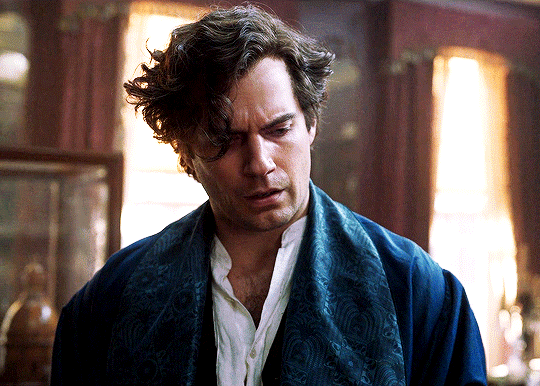
WC:4.7k+ GIF by gay-bucky-barnes
dark!Sherlock X reader
{warnings: NONCON/DUBCON!! reader is sold!! mentions of prostitution in Victorian era!! misogyny!! age gap!! blood but not a lot at all!! dirty talk!! virginity loss!! breeding kink!! insane Sherlock!! murder!! like this is dark baby!! manipulation!! brainwashing?/Stockholm syndrome!! kind of a sugar daddy?!! dacryophillia!! spitting!! }



Sherlock was accustomed to lady company quite often but the problem was the fact he didn't get satisfaction from any of the the ladies. After every intimate moment he shared, a numbness settled over him faster than he expected and he would lay there miserable all while his company was perfectly satisfied.
Sherlock heaved a sigh over his problem. He didn't want to be detached from his emotions during sex anymore. He craved to be wrapped up in pure bliss with the overwhelming feelings of love too. And that was apparently too hard for the detective to find. So he had decided to take on this problem like a case.
He stood at his desk staring down at the chart of paper. He needed someone who would fit his type perfectly, and even he didn't know what it was. He grunted frustrated over this. That didn't help him get any closer. By the time he had decided to just look at a local whorehouse, convinced that there would be a lady there who would help him due to their experience, night had fallen over the London streets.
Sherlock grabbed his coat and left his cane behind, trying his hardest not to be noticed by any that would recognise him. He headed down to the pleasure house that is simply known as 'THE PINK STRAWBERRY.' Apparently there, all the women smelt and tasted of strawberries and Sherlock was positively excited to see if this was true. He entered the establishment, allowing his eyes to drag along the men that were sat in the velvet chairs.
He headed to the desk where a man dressed in a dark 3 piece sat. He looked up at Sherlock and smiled. "What can I get ya' sir?" He spoke nasily and it made Sherlock irritated yet he hid it, determined to solve his issue. "Do you have anything new? Any new deals? Anything intriguing?" The man looked around before looking Sherlock up and down. "You ain't a pig are ya'?" He whispered the question and Sherlock leaned forward, "I am not." Technically not a lie, he was a detective not a police officer after all.
"Good then. I got a new deal indeed. A new girl just came in. Innocent as can be. Naive and dumb, perfect for molding. You can have her for the night. Or you can have her forever at the right price." Sherlocks interest peaked as he thought about the offer. The molding part definitely appealed to him. Don't get Sherlock wrong he was glad that feminism was making a move into society, but he needed a submissive wife. He had worked hard and supported enough so he deserved a reward.
"I'd have to meet her." The man stared at Sherlock suspiciously before he heaved out a sigh and slid a key to him. "You get five minutes. And then it's decision time. Got it?" The man stated it all firmly all while staring Sherlock down. "Understood sir." With the agreement made the man directed Sherlock to the room where this new woman was.
He unlocked the door feeling his palms slightly sweaty from nerves and excitement over the prospect that there might be someone by his side soon. He kept his eyes on the floor as he entered the room and then turned to close the door, preparing himself to see you. He turned and his breath was instantly knocked out of his chest.
You sat in the messy silk sheets. Clad in a white nightgown that was short on you and only just hid your lady parts. The sexy lingerie pushed your breasts together perfectly and you looked like an angel. Your hair framed your face perfectly and your big doe eyes stared up at him questioningly. Scared even. He scanned the rest of you, your lips were big and plush, your skin looked soft and your legs looked positively sexy to him.
Sherlock moved to the bed and sat in front of you, cooing as you slowly moved away from him, cautious of the strange man. "Do not worry angel. I am not here to hurt you. I wish to get to know you. My name is Sherlock, what is yours my darling?" You continued to stare up at him with those big eyes, mesmerising him. You whispered your name to him, your voice a melody to his ears. He repeated your name, feeling his heart flutter over how he pronounced every syllable of your name and how it would perfectly match up with his last name.
You stared at the hulking form of the man that sat on the edge of your bed. He was handsome yet he intimidated you. His eyes were a beautiful cold stormy blue, yet the way they observed you made you uneasy. It was like he knew everything about you just from a glance. His dark brown locks looked so soft and you couldn't help be drawn into the contrast of how he looked both hard and soft at the safe time. His broad shoulders and muscular arms that were tight against his suit had you squirming over how he looked almost godly. He was a specimen of a man, but you knew he was here for something you had tried to save. Your virginity.
"Is it okay if I call you angel?" He asked gently soothing you to a degree and you nodded your head at him. Still keeping your eyes on him. "You know angel, I was given an offer to buy you. I can get you out of this place and keep you safe and warm. All you'd have to do is be my wife. I can assure you there are no bad intentions behind this. I simply wish for a pretty girls company." His voice was soft the whole time and he allowed himself to reach out and hold your small soft hand in his large one. Embracing the size difference between the two of you and how he would have to go easy on you.
"I-I wanna get out of here. But I don't even know you sir. How can I trust you?" Your curious gaze lingered on him and he smiled softly bringing your hand to his lips and placing a gentle kiss on your knuckles. "You just have to trust me angel. You can ask me anything you want and I shall answer." You examined him and his soft demeanour trying to conclude if it was fake or real.
"O-okay. Why do you want a wife sir? You're already h-handsome enough. I am confused as to why you've come to a whorehouse to find a wife. It's almost ironic." Sherlock chuckled at your mumbles. "I need someone pliable to my needs. I've struggled with connecting my emotions to sexual activities so I'm seeking an emotional bond first. A whorehouse is where women are used to finding a man's pleasure, I believed they helped me. And indeed they have, they've brought me to you."
You blushed at his words, yet you remained confused over them. You had no idea what to expect from the hulking man and if you rushed into a relationship with him, you were scared of where you'd end up.
"Can I confess something Mr. Sherlock?" He resumed his soft smile allowed his gaze to soften too. "Ofcourse angel, anything to keep hearing your heavenly voice." You blushed at him before bringing your gaze to his, allowing your eye contact to hypnotise him. "How do I know you won't hurt me?" Sherlock got off the bed before he kneeled down with his hand on his heart staring up at you in the bed from his bowing position and spoke confidently. "I promise you, I would never raise my fist at a woman and I would most certainly never even dream of hurting you angel." You smiled finally and nodded at him.
He stood up and resumed his place on the bed, allowing his final few minutes of getting to know you be filled with you shy mumbles of what you liked and who you are. A knock on the door startled you and he placed a large hand on your leg comforting you. The door then opened revealing the man from the front of the house.
He started displeased of Sherlocks hand on you thigh and spoke loudly and confidently. "So, do we have a deal?" Sherlock turned his head to look at you and you stared at him. You saw his eyes scanning your reaction and you looked away with a blush, not wanting to give away the fact that you were hopeful to be leaving here and even excited to become a wife. Sherlock grinned at your shyness. "Yes we do have a deal." And with that Sherlock threw a bag stuffed with coins and notes at the man making him gasp at the amount inside.
Sherlock turned to you, and grinned making you smile too. "Come angel, let's go home."
✧──────────────────────────────────✧
Adjusting to life with the detective was a hard one, a terrifying one. You never really agreed to be with Sherlock, you felt like a cattle being sold off to the next consumer where you would eventually be slaughtered and devoured. You were forever grateful to God above for saving you from marrying Sherlock as he had no time at the moment or the coming moments to take your hand.
He had often argued with himself over it and you stood looking at him. You remember when you came into his office and saw him staring at his chalk board filled with writing and conclusions and you heard his frustrated mumbles clearly. "Stupid fucking pricks. I will marry her, she will be mine and that'll show them. I'll make sure she's fucking filled with my kids, so that then you can't deny letting me marry her. And I'll ofcourse get kids. What a perfect scenario." You gulped and tiptoed away terrified.
You were often alone at Baker Street, staring longingly out of the window trying to figure a way out of this hell hole. Yes Sherlock never raise his hand at you but his insults were vile and left you heartbroken and self conscious. He often reprimanded you for ending up in the whorehouse rather than waiting for him, and when you went to respond about your father selling you he would cut you off with a glare filled with a darkness that filled your stomach with dread.
Because of the long periods of time being locked up in his house, you had become accustomed to the lay out and began to hatch out a plan of escape. You had to plan it carefully making sure that the detective didn't suspect and that you were 2 steps ahead of him. You mapped out the floorboards and the windows, even single structure of the place and began planning any route that would lead you to the streets where you would bolt and never look back.
After you had planned four pathways perfectly so that even the mighty Sherlock Holmes wouldn't even suspect, earth shattering news was given to you. You see while you thought you were cautious and cunning, you were actually sloppy. Sherlock noticed every move you made, he overlooked your plans while you slept and chuckled at how silly they were. From going under the floor boards to jumping out the window.
He knew he had to find a way to discourage this, afterall he had spent money on you and was promised a moldable doll that would fulfill his needs. And don't get him wrong, he was most definitely attached to you emotionally. Everything you did drove him crazier in love with you. From something as simple as you gentle morning breathing when you were at peace to your more fiery moods when you were planning an escape erratically. He loved your passion, your gentleness and your ever growing desires to escape.
See he also had a plan too which would boost his love for you and unite you both. Yet first he had to discourage you, crush you. And he did this by killing your parents, making sure it ended up in the newspaper where he then gave it to you. He watched with sadistic pleasure as your eyes filled with tears over their deaths. Yet he did not predict you throwing yourself into his arms and sobbing.
You longed for some form of comfort, even if it was with the man that held you prisoner. His arms were warm and for a small second that bled into a week, you felt safe. You felt comforted grieving in his arms, he promised to take care of you and he had. He was. "My Angel, you know that I adore you. I will keep you safe forever, you just have to stop fighting. Let yourself fall into being Mrs. Holmes and I'll promise you whole the world." He whispered gently into the crown of your hair, you hummed, your throat aching from crying so loudly.
And after hearing his words of adoration, you let yourself sink into him. Into his love and his comfy and soon he began surprising you. He brought you home beautiful dresses, jewelry. Anything you wished for he would bring to you. It was then that Sherlock realised the key to your heart was through money and beautiful things, so he decided to spoil you in hopes to catch you when you fell deeply in love with him.
He remembers the time he got you to wear your potential wedding dress. A long white dress covered in lace with long arms. You walked out shyly and coughed quietly. Sherlock turned and his mouth opened slightly, his eyes widened slightly and a blush coated his cheeks. With quick firm steps, he headed towards you and placed his large hands on your waist. You looked down meekly, mumbling, "What do you think?" Sherlock brought his hand up to your chin, tilting your head up to look into his eyes. He flashed you a charming smile before he gently spoke with passion and love swirling around his eyes. "You look perfect angel. Truly sent from heaven."
All too soon you found yourself surrounded by gold and rubies, and as beautiful as they shined, but it only helped prolonged the aching in your heart. The need to run free and choose your own fate began to rise up in your blood again and you began devising your escape again. And Sherlock caught on immediately feeling his heart ache that his gifts weren't enough to satisfy you. But it was no matter, you would be thankful soon, you would worship him for the gifts he bought you.
✧──────────────────────────────────✧
Tonight was the night that you escaped. You were ready, Sherlock had told you he would be working late and you faked a pout and spoke gently, "I hope you hurry home soon, I get lonely with you honey." To which he placed a kiss on your forehead and then on your lips before rubbing your noses together and replied in his soft gruff voice, "Don't worry angel, I'll be with you sooner than you think." And then he headed out the door locking it.
You looked outside and saw the darkness spread down the streets and the with a sigh, you dragged yourself to the kitchen and grabbed a knife. You were prepared to fight for your freedom. You stared in the mirror, you were dressed in your comfiest dress and you were thankful you took your corset and other accessories off. You put on sensible shoes and then heaved a breath in and out and started to undo the window lock. You heard a click and smiled.
You got up and pushed yourself out of it so that you were sat on the ledge. A cool breeze swept past you and you breathed it in. You looked down your heart hammering at the giant drop that you faced. There was a large bin beneath you thankfully yet you were still terrified. You closed your eyes and pushed off the ledge suppressing your scream the best you could. When you peaked your eyes open you saw your in the large dumpster and saw that many pillows were stacked in here to cushion your landing.
Your blood turned cold at this and you quickly scrambled out. You fell out and as you pulled yourself up, you heard the familiar taps of a cane. Sherlock knew. You froze and turned to stare at him. His face was blank and he stared at you. He spoke clearly. "You may have thought you were 2 steps ahead of me angel. But I am always a leap ahead of you. So I give you the choice. Go back to our room and your punishment won't be that bad and I will forgive you for your temporary lapse in judgement."
A pause played between the two of you and you felt tears gather in your eyes. You had come so far, you were so close. You waited for him to speak feeling your heart hammer. With a heavy sigh from Sherlock, he spoke again, his voice deepening a warning evident in his tone. "And if not, then try running and see what will happen angel. Because I can promise you, I will tear your wings off and break your halo before you can even apologize."
Your heart raced and you slowly turned gulping. You had worked too hard and with that one thought playing through your mind you sprinted and a dark laughter soon followed you. And before you could even make it to the first lamp post you were tackled onto the ground by his hulking figure. He spoke hotly into your ear, "I warned you. Now you're gonna deal with the consequences." He pulled you up over his shoulder and stomped to your shared apartment. He kicked the door down and the kicked it closed.
He stormed to the bedroom and threw you onto the bed. You gasped trying to catch your breath from crying and the fear that was vibrating in your chest. You watched as he quickly stripped from his clothes in anger. His predatory gaze settling on you immediately after his cock sprang free. You couldn't bring yourself to look at it. Instead you continued begging with your eyes to stop this but you were only met with his cold, dominating gaze.
"Strip." He said, his voice a hiss. You shook your head crying more. "Do it or I'll do it for you." You let out a pitiful sob and within seconds he was upon you and tore your dress open. Buttons popped off and seams torn, your breasts spilled free and within a few moments of them being exposed, Sherlock brought his head down and took a nipple into his mouth. Licking and sucking it, you felt yourself grow wet for him yet you held back your moans. A squeal left your lips as he quickly bit your nub and smirked. All the hike his thumb was pinching and caressing the other.
He pulled away and stared down at your tits. "Just wait til these are full of milk for our children. Your breasts will get so heavy, and I'll happily hold them. Fuck this little body is so perfect. Pretty tits to match your pretty face. I can't wait to mark them up with my bites and my cum. And don't give me any crybaby shit, this was your choice whore."
He soon tore the rest of your dress off followed by the rest of your clothing. You quickly tried to shield yourself but he was too fast. He grabbed your wrists and pinned them above your head and smiled wickedly at seeing your naked body on display to him. You slowly brought your gaze down his body, getting wet at the sight of his muscular arms and his chiseled body. And then staring in shock over his big cock. It was long and girthy. A prominent vein running from the bottom to just under the tip.
Sherlock settled between your legs, you were hip to hip and with a grunt, he grabbed his cock, and slid it up and down your folds before pushing into you ripping the air from your lungs and replacing it with a scream which was quickly muffled by Sherlock's massive hand. He stared down at where you both connected and groaned feeling your pussy tighten around him trying to lubricate itself around his massive cock.
"Fuck. You're tight little pussy is fucking perfect. So warm, so tight. It's fucking hugging my cock. Your pussy is a big a whore as you. You wanted this, you wanted me to fuck you. You wanted me to shove my big cock into your little pussy. Awwh look at your tears, you look like such a slut. Maybe that's why you were in the whitehouse, cause you're just a fucking slut."
He looked down at you and smirked and your closed eyes, he moved his hand from your mouth to your chin and then pried your lips open with his thumb and then spat into your mouth. He then held himself up with one hand, remaining perfectly still letting you adjust to his cock. He then spat on two fingers and brought them down to you clit and began rubbing viciously. He then stared down at you again and pressed his mouth to yours.
He swallowed your groans and moan and let his tongue swipe around you mouth letting him taste every part of you before pulling away while sucking on your tongue. When he pulled a way a wire of spit attached you both for a second before it broke and splattered on your face. He smirked and the felt how wet you were and licked from your cheek to your temple. You fluttered your eyes closed until his hand gripped your jaw, and took away the small bit of pleasure you were feeling. You stared up at him mortified.
"You will look at me. Understood, I'm warning you. You keep your pretty eyes on me. With your fucking pretty crocodile tears. You keep looking at me or else it will get worse. I'd hate to lay my hands on your pretty face an leave a nasty mark there."
He then began to rock his hips and let his thrusting start slow and steady. Letting your virgin cunt get used to his cock and his thrusting. He moved his gaze from your eyes to where he was in you. As he pulled out he saw bits of blood on his cock and he groaned feeling a sense of glory over taking your virginity. And after he felt that glory he let himself go and began thrusting with wild abandon.
"You were a fucking virgin. God that's so fucking perfect. My good girl. You saved this cunt for me didn't you. Ofcourse you did, you had no idea what to do with it until you met me. This is my cunt now. I'm gonna cum in it, so it's fucking mine!"
You began moaning and whining feeling bliss wrap around you everywhere. You brought you legs up to knot around his hips, needing more of him even though you didn't want more. Your small hands travelled to his broad back and began scratching it, needing to grasp something to hold onto reality from the pleasure you were feeling. You felt the knot in your stomach and unwinding and then you finally felt go and came all over his cock with moan that echoed in his head.
He placed his head in your neck and planted kissed and sucks everywhere. Covering you in his love bites and the pure fact that you were purely his in that moment nudged him closer to his climax. And then he felt your pretty pussy flutter around his cock and cum all over it. And soon he lost control and came in you. Making sure to fill you up and not let one bit go to waste.
"Fuck did so good. Did perfect. Gonna make me a father aren't you. Such a perfect little angel, such a good girl for carrying all my kids. Did so fucking good taking my cock, gonna get a ring on that finger tomorrow and then I'm gonna fuck you until you can't think of anything but me. My angel. Gonna make you love me as much as I love you."
He laid on top of you and peppered your face in kisses, whispering things into your ears that you didn't hear as you were too blissed out and were close to falling asleep while he still had his cock in you. You let your eyelids close and your breathing slow as you drifted to sleep with Sherlocks cum dribbling out of you.
✧──────────────────────────────────✧
You and Sherlock had moved into a much more spacious home and it was truly wonderful. The garden was big and filled with flowers and he would pick one single flower a day and present it to you before explaining the meaning. You were positively drowning in his love. So much so that you had stopped fight against it and allowed yourself to sink into it. And in return you gave Sherlock all the love in your heart too, allowing for your mind to be vacant with everything except Sherlock and your family.
Enola adored staying over to play with her nieces and nephews. In total you and Sherlock had 5 children, not counting the one that was currently in your stomach. With 3 strong boys and 2 gorgeous girls it seemed like life was complete. Enola taught them key things even if they were little, but they understood. You blamed that on Sherlocks genes afterall he was the smart one.
Speaking of, you just heard the front door close and the sudden parade of small feet dash down the hall to see their father. You giggled and continued making dinner for everyone all while pregnant and a baby in your hip. Little James was quite the mother's boy and he was clingy. Yet they all were at his age. He babbled to you as you stirred the stew, he listed colours and insects trying his hardest to remember what insect came out of a cocoon.
You heard the childish laughter getting closer and the heavy footsteps of you husband. Sherlock watched you, absolutely mesmerized by how perfect of a mother and wife you were. Don't get him wrong he still supported the feminist notion slowly rising, but he could not bring himself to allow you to do any of it. Seeing you as a reward for all his hard work. He drew his attention to James sat on your hip listening to his confused babbles.
"A butterfly my dear James." Your son's eyes lit up and you gently placed him down for him to wobbly toddle towards his dad for his daily cuddles. You smiled content at the homely and domestic atmosphere. You zoned out looking at the blue sky, still stirring the stew, completely missing Sherlock dismissing your children to go and wait in the dining room.
With gentle steps, Sherlock curled himself around you, and you leaned back into him and turned your head up and slightly turned it, and he placed a soft gentle kiss on you lips and gazed into your eyes lovingly. "How were the children, Mrs.Holmes?" You smiled, "Enola came over and kept them busy drawing, yet James decided to cling to my side and question me as to why my stomach has gotten so big."
Sherlock chuckled and moved his large hand up to your stomach cradling your pregnant belly. He placed a soft kiss in the crook of your neck before gently whispering, "And how are you my love, is our little one treating you okay?" You sighed happily feeling peace radiate through your bones and into Sherlocks. "I'm fine, they were kicking up a storm this morning but I think that's because they weren't ready for daddy to leave for work."
He hummed, "I apologize my angel. Truly, this one is going to be a little devil and I think that's my fault entirely." He said smugly. You giggled at him, and allowed him to keep cuddling you as you made dinner and settled into your husbands embrace and his dark love.

#henry!sherlock#henry!holmes#henry!holmes x reader#henry!holmes x black!reader#henry!holmes x woc!reader#henry!holmes x plussize!reader#henry!sherlock x reader#henry!sherlock x black!reader#henry!sherlock x woc!reader#henry!sherlock x plussize!reader#sherlock x reader#enola 2#enola holmes#henry cavill#henry cavill x female reader#henry cavill x plus size reader#henry cavill x black reader#henry cavill x woc reader
809 notes
·
View notes
Note
The way you draw Etho is so freakin GENDER!!!!! and I love your zombie au so much!!! Is there anything you've really wanted to talk about with the au that no one's asked about yet? :D
First of all, thank you for reading/enjoying the things I've been drawing!! Second of all, what I want to talk about could fill a novel or two, but I've settled on flowers today.
A couple months back, I decided to assign a handful of characters in the AU flowers. Mostly just for fun, but I do use them in my illustrations, and Joel and Lizzie's flower makes an appearance in the comic.
Technically, the meanings of some of the flowers below can change depending on color and who you ask. I chose whatever I jived with most.
Anyhow, here they are;
Cleo-Hyssop
In general this flower represents humility, repentance and sacrifice. I've seen in my travels that it's mentioned in the bible, in the context of cleansing/forgiveness. Fun hyssop fact, it's actually a garden herb from the mint family.
Etho-White Lily
White lilies are all over the place in terms of meanings and associations, so I'll only touch on what specifically applies. They're a popular funeral and wedding decoration. The color white is heavily associated with purity, but I chose these for their ties with death and rebirth. Them being a popular sympathy flower is a bonus, considering he's presumed dead for the majority of the comic.
Joel and Lizzie-Morning Glory
Morning glory has a handful of meanings, but the most popular ones are all centered around love; love in vain, undying love, sometimes even obsession. I like the way morning glory twists around things, it's one of my favorite flowers despite it's weed status. In general, morning glory is known to smother nearby plants and they require a lot of consistent effort to get rid of. This is pretty well known, but most morning glory blooms in the morning and closes in the evening.
Grian and Scar-Poppies
This is a really popular fandom thing already, and I think death and remembrance are really fitting for them. They're also closely associated with sleep, peace, undying love and sacrifice. I associate them very strongly with the Wizard of Oz, and that movie strikes a really great balance of nightmare and reverie for me.
Martyn-Hemlock
It feels weird to talk about characters I haven't introduced yet, but I'm doing it anyway for the prank of it all. In Victorian era flower language this flower is tied to the phrase 'You will be my death.' Hemlock is (allegedly) associated with dark arts like necromancy and it's generally seen as a sign of danger.
I only went ahead and chose flowers for people who have really important roles in the story, so apologies 75% of the characters aren't listed. Just a fun little list, I don't know if folks are as crazy about flowers as me, but anyways thanks for reading! Below is a lil scribble I did up on tracing paper back in February.
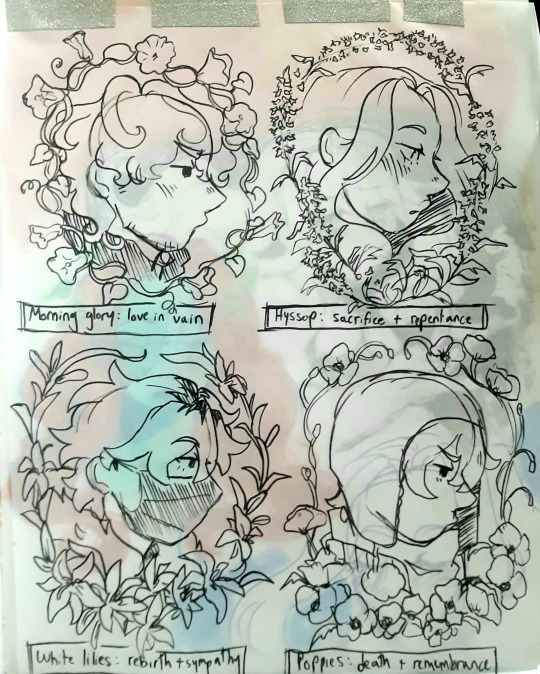
Take care!!
#falconearringzombieau#asks#life series au#ethoslab#i dont feel much like main tagging everyone mentioned
217 notes
·
View notes
Note
Hi there! The al-mighty god for POTO costumes! I have been quite interested in Monsieur Andre's costumes(I htink he has four sets of looks in total, the one at the auction, the ione with the coat on at Hannibal, the evening dress, and the sketelon costume) and curious about the inspirations for his costumes or the style in which Andre is dressed. Is there anything reliable reference on fashion history you might suggest reading? Thank you!
Sorry for the very late reply! I have not ignored you, I've simply waited until I had the time to give you a proper reply.
First and foremost, ANDRÉ COSTUME LOVE! That happens like... never?! So yay. His first costume is the one he wears in the Auction scene, which is supposed to be set some 30 years after the main story. He wears a grand cloack with collar, and a black felt hat with pinched front. Often also a scarf, but it's not written in stone. These pieces are worn over his regular suit (to allow a quick change for Hannibal), but a long beard is usually added for the Auction scene and removed for Hannibal. Here's Maria Bjørnson's design next to Fernand Delosch's costume in Essen:

Then, for Hannibal: the same main suit, but now with a more tailored coat with fur collar, and a top hat. Both this costume and the previous are meant for outdoor wear, so in both instances we are to assume he has just arrived from somewhere outside the building. The design suggests frog fastening, but this is not often done in the stage costumes. I don't know why. The depicted managers are Steen Springborg and Morten Staugaard in Copenhagen (detail photo of Sebastian Harris in Copenhagen):


The third costume is technically one André has worn all along, but now it can be seen on its own: The black velvet tailcoat, pinstripe black trousers, golden or white waistcoat, and white shirt and bowtie. His hair and moustache is usually fluffy, and - depending on the actor - monocles or glasses can also be seen. This is formal daywear in the Victorian and Edwardian era.

The overall style has always reminded me of a portrait of the Norwegian artist Gerhard Munthe by Christian Krohg, probably the 1880s. I doubt Maria Bjørnson was familiar with it, yet I think he captures much of the essence. The sketch can be found here, and a painted portrait can be found here.
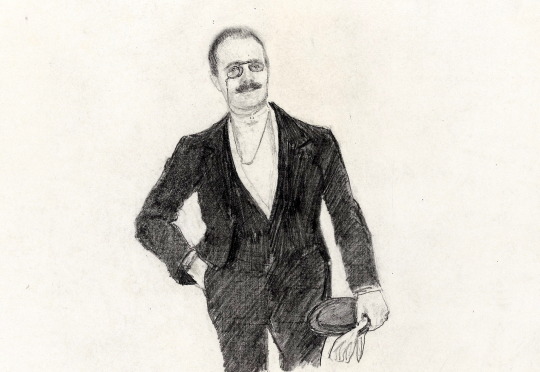
And just because the details are so beautiful, here's a closeup of Laird Mackintosh's monocle and waistcoat with blingy buttons.
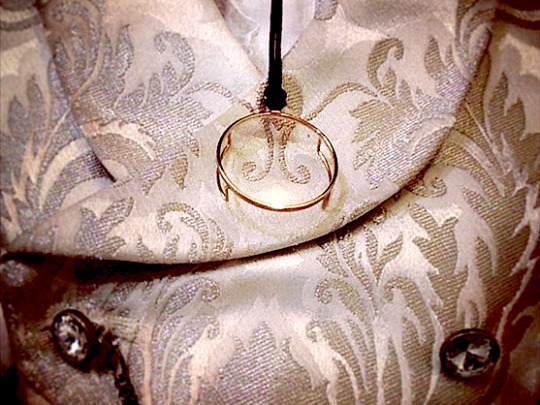
The above costume is worn for the majority of the first and second act, but for the Masquerade scene André is all in! Whereas Firmin "only" dons a dramatic cloak over his regular suit, André changes into a skeleton onepiece, often sculpted and sparkly, and with a black and red cloak, and a pointed black hat.

Details of an European skeleton suit:
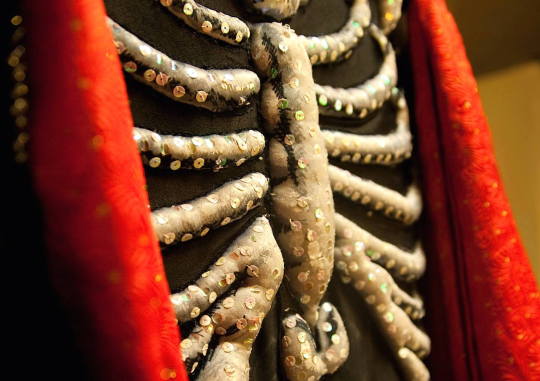
André's skeleton suit reminds quite a bit of what can be seen in publications from the late 19th and early 20th century. Fancy dress balls became frequent, and magazines and books followed up with numerous costume tips. This 1896 sketch rather screams André!

As for good costume references to seek out, I would actually start by looking at fashion plates. Simply because they show the ideal look, and variations over what was considered the fashion of the time. Google for fashion plates depicting men's fashion between 1880 and 1910, and I think you will find many nice references. A very random example: Fashion plate from 1894, showing formal-wear like tailcoats and evening coats (from The Met):

I don't know if this answered your question, but I hope so! :)
#gilles andré#phantom of the opera#costume nerding#maria bjørnson#phantom of the opera design#costume design
26 notes
·
View notes
Text
Avatar Modern Au Thoughts
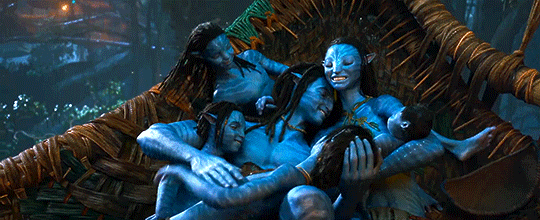

First and foremost why is it called modern au when they are already technically in modern 🤨
Like I get it cuz it’s easier to say modern au rather than 21 century au but like compared to the avatar time line the “Modern Au” is like the Victorian era since avatar takes place like 140 years from now😭
Second, am I only one who headcanons the modern kinda like a rich reality tv show mixed with a family sitcom
Like they living that keeping up with the kardashians lifestyle with unlimited amounts of money and shit but act like the god damn bradey bunch 💀
Like they live in this big ass house, everybody got they own room, Jake got the most luxurious mini van that ever existed, neytiri and Kiri have a $6000 skin routine, Lo’ak and neteyam have an unlimited Jordan collection, tuk always has the newest iPad and $1,000,000,000,000 robux, and hell spider got a two story extravagant 2 bed 2 bath will supplied appliances, food and no rent shed cuz neytiri don’t want him in the house
And yet they still go to public school 🤣Lo’ak and Neteyam have a part time job at Starbucks, Jake be driving the kids to practice, Neytiri waking them up once a month with that loud ass Ewya gospel music expecting them to clean the WHOLE mansion, kiri and spider running around and being rebellious cuz they in their teenage dirtbag phase, Tuk having all the boys in the house wrapped around her finger
The other family is like this too. all the kids(except tuk) all go to the same high school and they all one big friend group
Why am I like this 😭
I do plan on showing my outfit Headcanons, I’m just sick and lazy🥰
People who made me think about this(go read their stuff) 😫: @naavispider @hyperfixatedfandomer @roxynmae
#please tell i’m not the only one#avatar#avatarwayofthewater#spider socorro#avatarfanfic#fandom#jake sully#neytiri#neteyam#loak#kiri#tukitrey#headcanon#modern au
72 notes
·
View notes
Text
Cruelty is an Unreliable Weapon
The internet has been irritating me of late. This is in some sense, nothing new, but it has been irritating me very specifically in what I view as extremely wrongheaded thinking about the absence of any presence for morality in conflict. You can read between the lines if you so choose to infer what I'm discussing obliquely, but if you'd prefer, assume this is about people who are constantly whining that the Federation isn't tough or militaristic enough, or Galactic Empire apologists.
Settle in, get a beverage, because I got a bit wound up. This will take more than a minute. It clocked in at about 8 pages & 3600 words in Google docs.
Theories of Power and Victory
Two contentions are often made in discussions of war and conflict:
That the capacity to resist equals bargaining power without taking into consideration the manner of resistance i.e. committing atrocities.
The second is that suffering hastens the end of conflict.
Let's examine this. I’m going to primarily lean on case studies from World War 1 because they allow me to speak about modern conflicts via allegory. Allegory by necessity obfuscates the real message the reader is expected to take away from this.
I am at peace with this. If I tell you what to think about the conflict between the United Federation of Dave Filoni Truthers and the Galactic Republic of Rian Johnson Apologists, you will be more inclined to be combative.
If I engage in a bit of obfuscation, then you’ll be more inclined to take these case studies as they are intended. These are thought experiments and frameworks. My hope is you use them to think through modern conflicts where you may be more inclined to fully dehumanize the evildoer or wave off complaints about the behavior of the righteous as “regrettable but necessary.”
Loosening Rules of Engagement: Almost Always a Bad Idea
In World War 1, there was a continual escalation as all sides sought new innovations to break the deadlock. This took the form of both new weapon systems but also new strategies.
Technically commerce raiding is arguably as old as the idea of putting trade goods on a boat, but the usage of submarines definitely represents an escalation and innovation on that idea. In theory we were beyond the days of letters of marque. Assaulting civilian shipping would be considered atrocious and ungentlemanly in normal times.
However, in an era of total national mobilization, it is the very foundations of the nation that are supposedly necessary to be chipped away at in order to try to obtain the defeat of the enemy. In the arguments made under conditions of total war, there may be non-combatants but there are no persons who are truly uninvolved because in a total mobilization, everyone is contributing to the war effort whether with their sweat or their blood.
Even children, especially in the late Victorian era, are net contributors because they take on responsibilities formerly held by adults and, if the struggle is prolonged, will grow into adults who can be drafted or more fully contribute to the industrial effort.
Yet the enemy doesn’t stop thinking of their children as children. The enemy doesn’t stop thinking of their non-combatants as civilians, even as the enemy rationalizes their way into killing the children and non-combatants of their opponents.
So what happens when Germany expands its commerce raiding to include civilian liners suspected of carrying arms ought to be very predictable. The story of the US entry into WW1, if it's told at all - and that’s another bag of badgers - often centers on the sinking of the passenger liner Lusitania.
Arguably the sinking of the Lusitania does hasten the end of the war, but not even remotely in the way that Germany anticipated and definitely not in its favor. It's important to note that the story is not so neat and tidy. The Lusitania is often held up as an inciting event, but the US doesn’t enter the war for another two years when Germany resumes unrestricted submarine warfare.
Rather than say “my bad, you’re right, we shouldn’t have tried to play silly games with sending weapons on passenger liners” the US entered the war in an official capacity. The US entry into the war wasn't decisive right away, it was arguably even more bumbling and horrific as the first year of the Russian invasion of Ukraine, but it makes the endgame that much more inevitable for the Central Powers.
Don’t blur the lines between military and civilian.
Germany essentially walked into the trap that Britain baited with international civilians. There are no objectively correct moral actors in this situation but we can certainly dissect the consequences, especially for Germany, of having elected to not take the high road.
When it comes to the US entrance into the war, this story is complicated by the fact that there was a strong contingent of Manifest Destiny true believers who didn’t look at the Western front and feel appalled at how far honor, nationalism, hate, and sunk cost would drive people. Rather instead they saw an opportunity for the US to take her rightful place as a key player in The Great Game.
So it's easy to argue that absent the sinking of the Lusitania, the US would have been dragged in anyway. It was, after all, the biggest creditor of the Entente and were Britain, France and friends to lose, it's quite likely that repaying the Americans would come second to compensating the Central Powers for the inconvenience of having to send millions of people into what amounts to a wood chipper.
However, the sinking of the Lusitania definitely moved up the timeline of the US entry into the war. A thing that could have been delayed, and perhaps even prevented if one or more Black Swans had scrambled US domestic politics. Because the Germans failed to practice a stricter set of rules of engagement, a new player takes the field, the US is able to arm Britain and France more prolifically and openly, and Germany’s goose is pretty well cooked. The only question being how long it was going to take to cook that goose.
While there was certainly malice, pride, and national chauvinism involved in creating conditions in which Germany would be tempted to escalate by striking ships with Americans onboard, there’s no ironclad law of physics or human behavior that dictates the US was going to enter the war.
Had the United States wanted to stay out of the war it could have made a range of different choices, some of which arguably were against the prevailing understanding of its “national interest” and some could be read as rewarding German threats of “terrorism” against civilians, but “bad” options are still options:
Forbid mixed use Entente ships from using US ports.
Forbid American passengers from booking passage on Entente ships carrying weapons.
Warn Americans that their personal security is their responsibility and if they do enter contested waters on a ship that might be considered a legitimate target, they’re on their own.
The British own part of this too: it was their choice to comingle arms shipments and civilian passengers.
It goes without saying that the Germans also weren’t obligated to sink Lusitania.
Of course this choice is complicated by a whole host of contextual factors: British ships had been instructed to try to ram German submarines instead of submitting to boarding and inspection, and some British civilian ships had been armed.
Allowing Lusitania to go along her way peacefully also rewards the British for using human shields.
I don’t find the Germans morally praiseworthy here, but the British deserve heaps of scorn for intentionally putting civilians in danger in order to prioritize winning a war that was anything but existential for it and then daring the Germans to kill civilians to disrupt the British war effort.
What happens if the Germans don’t take the bait? Well, the war definitely goes on and is that much harder for the Germans but they retain a measure of the moral high ground.
Could this win them useful allies in the court of global public opinion?
Or at least keep certain disruptive players like the US out of the war?
The US was the last great power to not take a side as of when Germany and the UK began their nautical shenanigans with tragic consequences. It's doubtful the US could be compelled to enter the war on the side of Germany, hence why Germany could have understood its situation as necessitating unrestricted warfare against not merely the Entente militaries but the Entente people themselves.
However, again there is nothing inevitable here. There are a lot of reasons why the US staying out of the war was unlikely, but it's far from impossible - I don’t believe in historical inevitability, just higher or lower probability.
Because of this lack of inevitability, it is worth restating the moral proposition Britain cast aside:
Don’t comingle military and civilian.
You ignore this advice at your own peril. The consequences are entirely predictable.
The US may very well have not come charging in to bail out the Entente. It could have sat on the sidelines and cut support for the Entente to punish the UK for putting foreign civilians at risk. I think it would have been VERY morally defensible to do so.
There are scenarios, such as insurgency, where the camouflage of being civilian in appearance is necessary if armed struggle is to be at all viable, but again the consequences for “real” civilians are very predictable.
That doesn’t mean the party that winds up killing civilians, intentionally or unintentionally, is morally blameless: it's a choice to loosen rules of engagement or to not exercise even greater care when dealing with ambiguity. There is no mandate to kill civilians through recklessness, indifference, cruelty, or to deny the enemy an advantage.
Everything is a choice.
Immoral choices are rarely unavoidable. Accidents truly happen and are tragic, but caution isn’t a frivolous thing to be cast aside for convenience or galaxy brained theories about psychological warfare as Germany’s fate demonstrates.
Yet, to beat a dead horse, to say that those who blur the lines between combatant and noncombatant have no responsibility for what happens to noncombatants is also deeply disingenuous.
Suffering is an Inconsistent Weapon at Best.
There’s a deeply felt conviction among some that hardness wins wars faster. As near as I can tell the premise usually comes from one of two sentiments.
The first is that the enemy, being a rational actor, is capable of “doing the math.” Once they understand what the aggressor is willing to do to win. How far they’ll go, then every day that surrender is deferred is just more rapes, homes burned, prisoners tortured, more famine, more suffering: pick your poison. Therefore the reasonable and moral thing to do is to just get it over with.
The Romans are probably the most famous example of a people who practiced unmitigated savagery when a city didn’t surrender promptly in order to induce others to not resist in the expectation of gentler treatment. This is a practice that preceded the Romans and I’d argue that it's unlikely that there is any corner of the world where there was no close parallel at some point in time.
While we can’t know for certain until and unless Russian archives are made available at some point in the future, it's tempting to ponder whether or not this mindset has influenced Russian atrocities such as in Bucha. The Romans were also guilty of not always being able to prevent their legions from going berserk even when a city was compliant.
Inflicting cruelty to try to induce surrender is almost definitely one motive behind the targeting of Ukrainian civilian infrastructure, especially electrical equipment during winter time. Which informs us that this mindset does continue into the present day, just expressed in different forms and contexts.
The second assumption is that sufficiently intense or broadly inflicted suffering would shatter the will to resist on a psychological level: creating panic, terror, disorder etc. We see this in its most straightforward form on ancient battlefields when armies rout after an understanding filters through the ranks that things are starting to go pear-shaped.
Whether or not this model can apply to something on the scale of a region or a nation is disputed and the answer probably is more about worldviews than objectivity.
If panic on the scale of a nation is possible, then panic doesn’t always achieve the desired result.
One might argue for instance that Western and especially US Islamophobia drove the US and allies to make a series of unforced errors with a human cost in the millions and still counting as the ripple effects are still rippling even after all this time. Calm and collected people may have been drawing lines on maps and debating the “get in and get out” or “if you break it, you bought it” models of war, but in the background is a subtler, longer term, persistent panic and existential dread induced by 9/11.
Of course it could have just been some mix of racism and imperialism. If that were the case then ascribing fear to the motives of Bush, Cheney, and the alumni of The Project for a New American Century incorrectly offers the villains the opportunity to plea bargain the charges down from War and Failed Occupation in the 1st degree to War and Failed Occupation in the 2nd degree.
For whatever it's worth the excellent podcast series Slow Burn: The Road to the Iraq War persuaded me that the primary, conscious motive was rooted in a broken epistemology about how to combat terrorism, the threat posed by Iraq, American capacities, and further sabotaged by philosophical infighting over to what degree and how to nation build that manifested in real world consequences for how resources were allocated, rules of engagement written, and which personnel got key jobs.
Let's return to World War 1, because it has probably more than just the two illustrations that are relevant here but I’m just going to limit it to two.
However, it's worth revisiting poor but possibly perfidious Lusitania, whose souls aboard needlessly died because the Germans decided to be edgy and declare the waters around the UK to be a free fire zone. Then the UK responded with “I dare you to enforce that” and put arms on civilian liners anyway.
Harshness did not, in fact, have the desired outcome for Germany. It failed to deter Britain from using dual purpose shipping and then following through with their threats ultimately escalated the conflict. Ultimately it's unclear if Britain’s will to continue the fight was impeded in any way and the popular narrative is that it galvanized resistance.
Although information warfare may have played a role too: the British government denied any violation of any of its obligations under pre war treaties or any violation of general decency: i.e. putting civilians at risk without their knowing consent. Messaging and the possible absence of knowing consent on the part of civilians is also worth holding in our heads when weighing the morality of ensuring the homefront is made to feel pain too.
Bringing the War to the Homefront
The British blockade of Germany in World War 1 has two rationales. One is that in total war, as discussed previously the civilian population is playing a very active part in sustaining combat operations. Attritional war is an effort to ensure that your side is not the first to run out of people or stuff. The average person is a lot more aware of this due in no small part to the way the Russian invasion of Ukraine in its second year has calcified into heavily fortified battlelines with much, much less in the way of dramatic maneuvers than in 2022.
The introduction of various destabilizing weapon systems: Javelin, Excalibur rounds, HIMARS, Stormshadow etc. has at each step momentarily unsettled the balance of power but Russia continues to be able to field enough people and material to absorb the losses and then adapt while Ukraine is, unfortunately, reliant on the patronage of allies and what industrial capacity it can scrape together and protect from Russia: no small feat in an era of satellite surveillance, rampant hacking, and cruise missiles.
Notably Ukraine or Russian partisans acting on their own accord or with assistance, have struck at various bits of Russian infrastructure and industrial sites.
This has made some commentators uncomfortable whether because of natural anxiety at seeing the homefront of a nuclear power get hit or a certain amount of hesitancy to label these as legitimate targets. Something Russia is not even a little squeamish about, nor (more controversially) was the US squeamish about during the first Gulf War.
Saddam Hussein notably would continue to be the ruler of Iraq, even under sanctions and bombing campaigns of varying intensity until the US led invasion in 2003.
Which brings us to the second rationale for the British blockade of Germany: punishment with the expectation that it would eventually break the German people. This included food. While this didn’t completely cut off Germany from food imports, the necessity of neutral ships to be inspected and escorted to Germany at minimum had a chilling effect that clawed back 55% of imports of all types and cut the average German down to 1,000 calories a day by 1917.
That’s one large McDonalds meal per person per day and that’s about it. I once had a salad, A SALAD, from Applebees that wound up having over a thousand calories.
Now of course, the success or failure of the blockade is disputed by historians. I have a lot of respect for the profession, but it’s also not hard to imagine that there is some motivated reasoning involved.
When a nation does something that is controversial in its own time, as the blockade was, and winds up killing between 400,000 and 800,000 people through among the cruelest of means: famine, if it turns out that these actions didn’t directly contribute to ending the war sooner, the nation who inflicted this on their fellow human beings is not exactly the hero of the story now are they?
So of course the desire is going to be very strong to gesture at problems with disorder, looting, and the increasing poor health of the military and civilian labor force as having made strong contributions to ensuring the war didn’t last longer and claim even more lives.
On the other hand, average caloric intake fell to a Special Value Meal per day (and probably much worse if you look at essential vitamins and protein) and the Germans kept going for five years. It's possible that absent the blockade, the war lasts even longer but that’s a counterfactual we simply cannot realistically examine because life isn’t an Excel sheet.
Duration also doesn’t necessarily directly map to intensity. If the war is not perceived as an existential struggle because both sides are attempting to collapse one another’s very societies to set conditions for peace on their terms, how does this change the tactics used in the field and the overall strategy?
Because if there is one point I want to hammer home it's that the perception of a war as being existential is intensely radicalizing. People will endure suffering that is unimaginable to people sitting in comfort and safety if they are operating under the belief that if the war isn’t won, the nation and its people will experience even greater suffering than they are experiencing under conditions of war, or even that the nation may cease to exist, its people scattered or massacred.
It's even harder for us to imagine that concepts like the German or British Empires might be worth “going over the top” for, or sitting around never knowing if a poison gas attack is going to be launched in your sleep. Or more nightmarishly: that you might feel so deeply that the fate of your nation is at risk, that it might be worth executing your subordinates for cowardice if they don’t attack enemy fortifications.
Of course there is also the example of modern Ukraine. It is rather clear that the people of Ukraine have taken very seriously the statements of Russian high level people that “Ukrainian” is an invalid identity that must be made to be subsumed into the Russian identity. One does not have to be an ardent nationalist, and I am not, to find this to be more than a little concerning.
It's not hard to imagine that extremely bellicose rhetoric from an opponent, when combined with growing suffering on the homefront and no doubt plenty of propaganda proclaiming the enemy to have an exterminationist agenda, would radicalize even people who are ambivalent to their government.
In 2002, it was widely expected that mounting casualties and a worsening economic outlook due to the war in Ukraine would seal Vladimir Putin’s fate. At the close of 2003, with nearly two years of fighting and one half baked mutiny in the books, Putin remains and is seemingly even more secure in power.
This is a more problematic example because it's hard to conceive of any strategy Ukraine or its allies can undertake that would preserve Ukraine’s autonomy while not generating at least some evidence to support Putin’s “Big Lie” about Russia being a victim pursuing legitimate security interests. Yet, in spite of this, great effort appears to have made to avoid feeding that Big Lie unnecessarily.
As of this writing, Ukraine has not pursued targeting Russian civilians directly either as an explicit policy nor is there much if any evidence it is doing so implicitly. Some in the amateur punditry of the fever swamps of social media have proposed Ukraine pursue payback against Russia for Bucha and other atrocities, but I think history shows this would be deeply, deeply mistaken.
Intellectual honesty compels me to hold up this example: sometimes a nation (Russia) (or just its political elite) can be responsible for the vast majority of the suffering its people have experienced and yet this too can be contextualized to fit a narrative that casts a struggle as existential, centers the chief provocateur as victim, and some critical mass of people will go along with it, rather than reject it and collapse the war effort from within.
Notably, while World War 1 shattered the Russian Empire, the various transitional governments between the end of Czarist rule and the eventual takeover by the Bolsheviks did not exit the war.
Consider all of these case studies, all ye who would dismiss rules of engagement as unworthy of dishonorable foes or inefficient, and would dismiss concerns about excessive cruelty or collective punishment as soft and defeatist.
#War#rules of engagement#ethics#cruelty#the great war#lusitania#Triple Entente#Central Powers#world war 1#laws of war#atrocities#crimes against humanity#collective punishment#escalation#current events
11 notes
·
View notes
Text
Wip Wednesday (technically Thursday for me)
I was tagged by @goldfish-fhr thank you!
I'm not currently working on anything Fallen Hero related, writing wise as I just finished up the latest chapter for my Victorian AU (psst! here's a link! Victorian Era AU - Chapter 4: Buried Deep ) but I'll still post a little of my current Dragon Age Fic chapter!
+++++
You are shaken from your thoughts when a round of laughter peppers against the fogginess of your mind. You shake your head and follow the joyous sounds and soon you find yourself standing outside where you know the mess hall to be. The door is ajar and you peek through the crack and you are able to make out the gaggle of soldiers surrounding a figure you can barely make out past the steel plates and pointed helms. You can hear him though. Voice having deepened a touch over the years but the joviality? The inflections in his words? They are just as you remember them to be.
There is a smile on your face as you push the door open and all turn to meet you as the laughter dies down and the crowd parts to reveal your old friend. Your first true friend. One you made that wasn’t of your blood.
It takes him a few moments longer to turn and see you standing there in the open doorway, a half-smile on his lips while the creases at the corners of his eyes deepen and you release a breath and a tension your didn’t know your body had been clinging to. Apprehension. Must have been. The last time you saw Alistair he had been short with his words you and you could not tell if he was simply taxed by the long journey he had taken to Vigil's Keep or if he still held resentment for you urging him along the path of royalty. You are glad that he now faces you with a smile.
+++++
Also I lied. Here's a little on the next Selkie AU chapter.
+++++
Her lips are the softest thing you’ve ever had the pleasure of feeling upon your own yet there is still a primal part within you that tugs at the more animalistic nature of your being. It urges you to bite down not let go until you draw blood but those thoughts are banished as soon as they are formed as Julia’s hands round to the back of your head and her fingers glide through your hair, nails scraping up your scalp and sending shivers through you that ripple out across the water.
You want to be closer to her, to feel her breath upon your skin and so you part briefly to the sound of a short gasp as you trail your lips along her jawline. Her hands twist and pull your waves of muddy green and you retaliate by grazing a sharp tipped tooth along the pulse that lives just below her skin nestled beneath her jaw and she tilts her head back with a sigh, bearing the warmth and richness of her bronze-skin throat and all you want to do is bite.
5 notes
·
View notes
Text

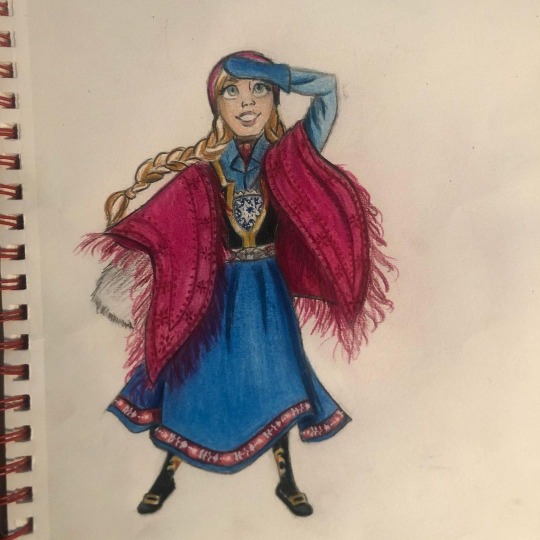
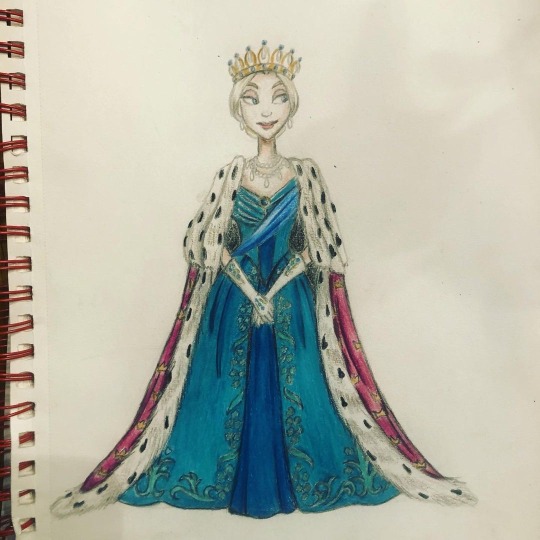
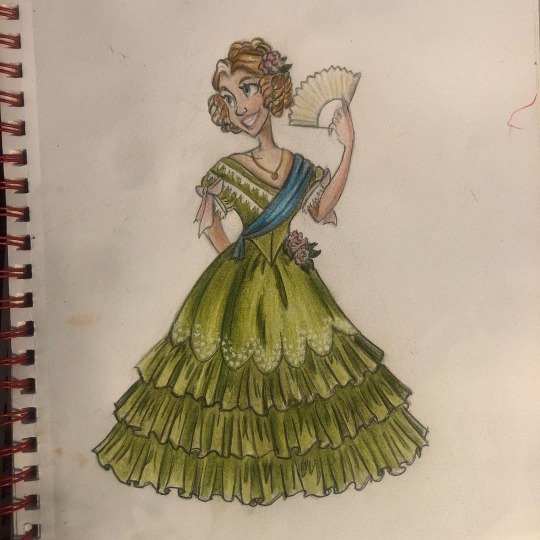
Entries 16 and 17 in my historical Disney Princess series: the Frozen sisters!
I know that Elsa and Anna aren’t officially part of the DP lineup (Frozen is a franchise all on its own) but I wanted to include them as they’re so well known and popular and a ton of people consider them to be part of the lineup.
Ok so these two needed a LOT of work. Frozen is one of my least favorite Disney films in terms of costume design and their outfits are virtually devoid of any semblance to fashions of the late 1830s to early 1840s, when the Frozen saga supposedly takes place (yet another Disney movie with a concrete time period!) If that hadn’t been made clear by a few hints dropped throughout the movies and shorts, I would have had no idea where to place Elsa and Anna, as their wardrobes look so modernized. PARTICULARLY Elsa’s ice gown from the first movie, that slim, slinky silhouette and high thigh slit would NOT fit into the 19th century AT ALL. Another problem with their outfits is that they seem to be based too much on the bunad, the Norwegian traditional folk costume for women, particularly because of the patterns and rosemaling.
For this project, I only focused on redesigning their main outfits from the first movie - Elsa’a ice gown, Anna’s traveling outfit, and both girls’ coronation day regalia. I took a few liberties with Elsa’s ice gown, given that it’s a fantasy go made of ice and she could technically do whatever she wanted with it while still sticking to the trends of the early Victorian era. Anna’s traveling bunad was the hardest of the four to do, as I initially had few resources for 19th century Norwegian folk dress, until I came across some authentic Norwegian folk wear and accessories on the website for this Norwegian museum, which I was thrilled to find! I am also convinced that Anna’s winter outfit is the most accurate of the four I’ve chosen.
Commissions info
#disney#disney Princess#disney fanart#historical Disney#my art#frozen#disney frozen#queen Elsa#Princess Anna#Anna#Elsa#angie’s scribbles
121 notes
·
View notes
Text
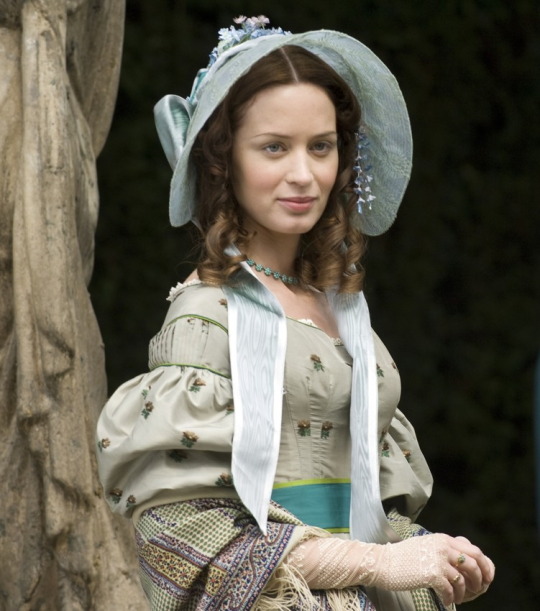
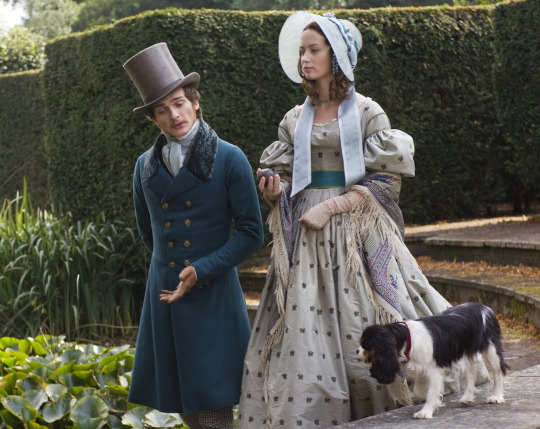
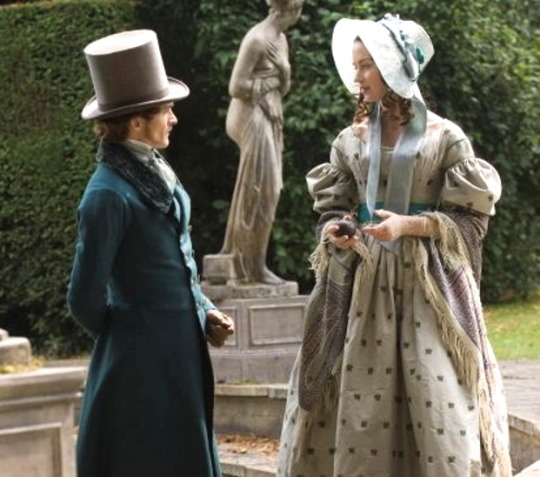
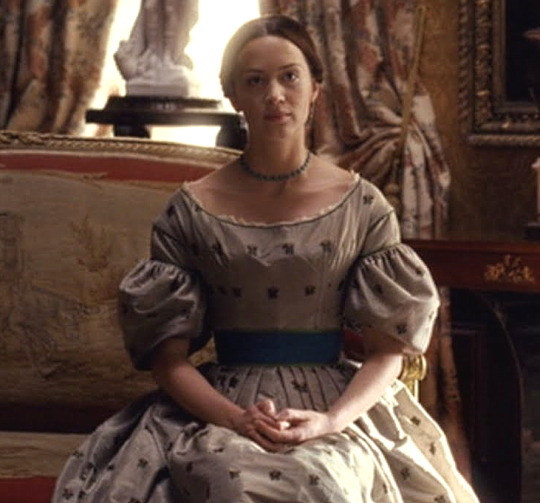
One Dress a Week Challenge
June: Grey
The Young Victoria / Emily Blunt as Queen Victoria
Victoria wears this round-necked grey dress in a couple of different scenes. I think those are embroidered flowers dotted across it, although it's hard to be sure. The low puffed sleeves are fairly restrained for the 1830s.
I like the teal sash, which echoes her turquoise necklace. And lace mitts are something you don't see every day!
#one dress a day challenge#the young victoria#one dress a week challenge#grey dresses#emily blunt#gray dresses#1830s fashion#movie costumes#period film#2009 films#2009 movies#technically not victorian era yet#19th century fashion#sandy powell#grey dress#gray dress
131 notes
·
View notes
Text
Lore Bites: Furina Drip Marketing
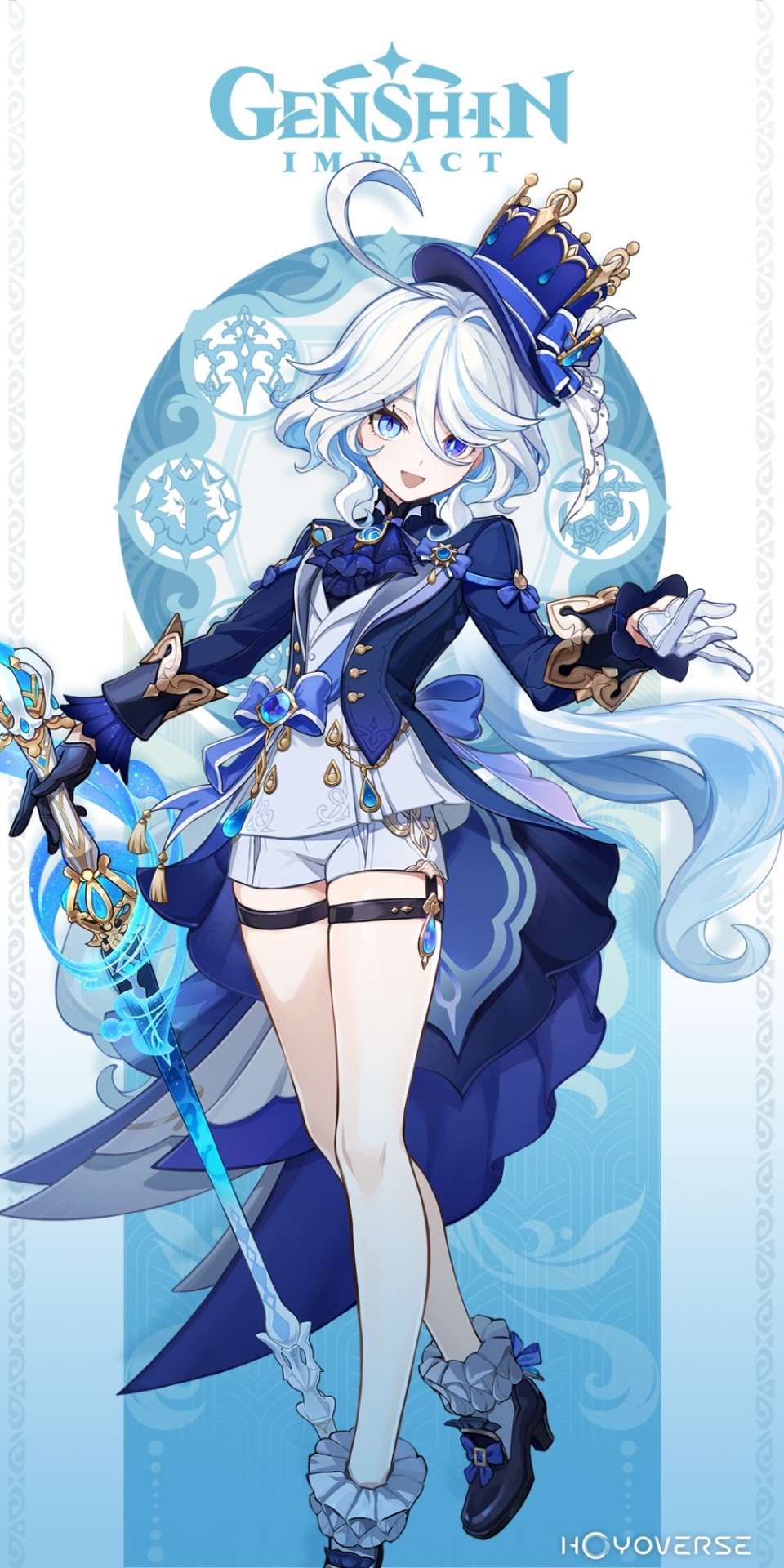
I've been chewing on Furina's design since she first appeared, because it's a lovely hodgepodge of elements designed to evoke a sense of duality: black and white, masculine and feminine, positive and negative, royal and jester. Even old and new: the combination of buckled shoes and ruffs from the Elizabethan age with a Regency dress coat and Victorian top hat suggests fashion from multiple eras. Not only does it look good, but it gives the sense that Furina is (aside from being VERY caught up in appearances) at odds with herself.
Furina's Irises - so far we've met two types of morphing Hydro creatures: Eidolons, and Tainted Phantasms. Technically, "eidolon" and "phantasm" mean the same thing (a ghost/spirit). However, they have different context: "eidolon" suggests the ideal form of said spirit, while "phantasm" suggests falsehood or deception. Furina's heterochromia may be a hint about a "lie" she's currently living as Hydro Archon - or it may suggest that she, like the Hydro Phantasms, is somehow tainted. (Or both.)
As it's been pointed out numerous times since the drip drop (see what I did there?), Furina's art does not have a false Hydro vision at the top of the background. At first I thought this might have to do with Neuvillette's recent leaked(?) voice line about Archons wearing fake visions to better blend into society - if everyone knows Furina is the Archon, she doesn't really need one. But then, Nahida and Ei would also not need a fake vision (everyone knows they're the Archons of their respective nations) - and yet they still have a Vision in their splash art. I'd like to speculate about why this might be, but it'll probably be in another post.

I'm not sure, but I feel like I've seen the word "justice" appear in those quotation marks multiple times. And when I see quotations it makes me think that the real meaning of that word might be just slightly different from how we understand that word. Could "justice" be something tangible? An energetic force? We'll have to wait and see.
N is Nicole, the Hexenzirkel mage who is believed to be the woman who spoke directly into our heads at the end of Inversion of Genesis. She is the "guide who will never get lost," according to Alice, and studies the "direction and order" of events in Teyvat. According to her, all things that happen in Teyvat are preordained:
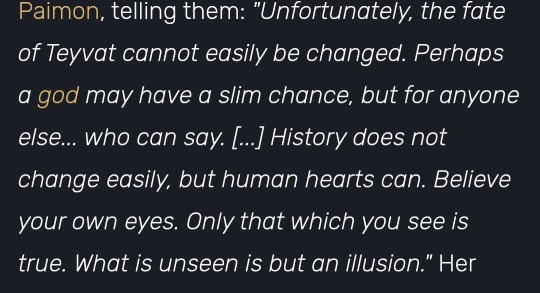
If this "fable left in someone's dream" is one of N's prophecies, the dreamer (likely Furina herself) is going to be hard pressed to change what's coming for her - even with the powers of an archon.
I tried to do an etymology search for "Furina" as a name, but there's a lot of conflicting info and very few legitimate sources to use, and I'm in denial that she's named that because of "furies." If anything, I'm more likely to believe the "-rina" in her name is supposed to be from the Hebrew for melody, or the Sanskrit for "melting/dissolving." But again, I don't even know for sure if those are the real definitions.
Endless Solo of Solitude is such a sad title - she's not just alone, but double alone. Forever. Jeez.
"Animula" is a diminutive form of "anima," one of the Latin words for soul (as I'm sure many have said already). For some extra trivia, it's not just considered the soul, but the irrational, emotional and sensitive part of the soul. So: a tiny, sensitive, fragile soul. (cries)
"Choragi" is the plural for "choragus," an originally Greek term for someone who lead, or more often financially sponsored, the choirs in Greek theater.
10 notes
·
View notes
Text
The Hierarchy of the Fandoms
So from what I gathered (no hate, it's not about how much I love them but about the number of people in it and when they were created) there is a Hierarchy of Fandoms.
First there are the Primordial Fandoms.
The primordial fandoms are the oldest of all, and were widely known and reknowned, but are now more or less dormant. They have little embers here and there when they are a base to a new series of movie.
The Primordials are the Greek Myths Fandom (still active), the Other Myths Fandom (scandinavian have a bit of activity too, but like a sleeping volcano has activity, roman clings on Greek, egyptian, slavic etc are mostly dead by now but everyone knows at least a bit about them) and the Medieval Legends Fandom (arthurian legend and such, vaguely active here and there but it's mainly embers of new series and movies, not the og medieval legends).
then there are the Elder Fandoms.
they are more fandoms than the primordial ones in fact, because they are knowingly fandoms and not based on an extinct pagan religion. It's the Five Great.
There's the Jane Austen Fandom, the Victor Hugo Fandom, the Victorian Gothic Fandom (and it's lord and commander Dracula, although Frankenstein is well awake these days too), the Tolkien Fandom and the Sherlock Holmes Fandom. But the Sherlock Holmes fandom and the Victorian Gothic, like the Others Myths Fandom, are a bit sleepy because most people are fans of the new adaptations, not the og books.
and then here are the two main categories of Golden Age Fandom:
the Multiverse Fandoms, circling around a whole bunch of different stories (Disney fandom, Dreamworks Fandom, Pixar Fandom, Marvel and DC Comics, etc.)
and the Saga Fandoms, around multi-books or multi-films / multi-seasons stories but all set in the same universe with more or less the same characters (Pirates of the Caribbean, Harry Potter, Percy Jackson, Avatar the Last Airbender, etc.)
it should be noted that Star Trek and Doctor Who are technically somewhere in the Golden Age but are also honorary members of the superior circle, being Elder Fandoms but not one of the Five Great.
then we have the Phoenix Fandoms
most of the time they are in deep slumber under the watchful eyes of the nymph Cringia, but sometimes they suddenly get popular and have a renaissance era (Twilight fandom, Divergent, and it's possible Game of Thrones recently entered a time of deep slumber and might, some day, awake again).
and also, since we're in the birds names, the Peacock Fandoms:
fandoms quite popular at their times, had their hour of glory, had a movie maybe, or even several movies, but now it's over, either from their own volition or because no one cares about them (Hunger Games, Labyrinth, GoT if it's not in slumber but in the Sacred Well of Oblivion they fell...)
and we also have the Newborn Fandoms
they are young stories, not teens yet or not much more. They are gaining in popularity but it's too soon to tell if they will ever join one of the superior or medium circles. It's Keeper of the Lost Cities, Downton Abbey, Our Flag Means Death, etc.
finally we have the Iron Fandoms
it's those little fandoms who might be active and all but are not universally (as in tumblr-wise) known and we see some fanart from them from time to times, but they don't have a great cultural importance (ex: Lore Olympus, UnOrdinary and other webtoons, Crown of Feathers, Warriors, the Magic Tree House, Wings of Fire, Charlotte's web, etc.)
#tolkien#jane austen#tolkien fandom#greek myths#game of thrones#lotr#Downton Abbey#kolc#keeper of the lost cities#Lore Olympus#Lo#UnOrdinary#warrior cat#crown of feathers#magic tree house#wings of fire#charlotte's web#our flag means death#hunger games#labyrinth#twilight#divergent#star trek#doctor who#supernatural#atla#avatar the last airbender#pirates of the carribean#harry potter#percy jackson
64 notes
·
View notes
Note
cannibalization wasn't illegal during the Victorian era, why hasn't anyone gone and devoured a small Victorian child yet
was going to do the "why are you asking me, a [thing] blog, this" bit but realized being a mychemical romance blog opened me up to this question really. i think probably it would be a lot of legal paperwork if u got caught Like even if it wasnt illegal there since its illegal now youd have to get some lawyer or something to explain that it doesnt count cuz it was several hundred years ago. actually i wonder how statute of limitations would work for time travel cannibalism maybe u could get off on a technicality of it having happened several centuries ago. will bring this up to the cannibalism fandom (my mutuals) for their consideration
#ask#if u got a good lawyer i think u could swing it But youd have to be very rich probably. or just dont get caught
10 notes
·
View notes
Note
has a travis fit check been requested yet?
it has not anon!!
MYSTREET FIT REVIEW - TRAVIS VALKRUM
MYSTREET SEASON ONE - CASUAL

Travis classic. Dark green hoodie with the black pants and the white accents. The green and black tends to blend together in certain lighting, but otherwise a solid fit
8/10
MYSTREET SEASON ONE - TOWEL

Love that Travis color coordinates his towel to his eyes. I’m fairly certain the value of the towel is the same as his skin, but this fit is, infact, iconic.
6/10
MYSTREET SEASON ONE - FORMAL

Apparently, Travis likes to dress like a Victorian gentleman for his arcade date. The color pallete is nice and using the same green int the tie for his cuffs is neat, but the double breasted vest is kind of inappropriate for the venue.
Also, whoever ripped the skin off the skindex forgot to change the hands to Travis’s skin tone. I do not think this counts as points off for whitewashing, however it is points off for lazy.
5/10
MYSTREET SEASON ONE - SASSY PRINCESS

Okay, sure. Sassy Princess Travis is an icon and a half. The cut of the dress is cute and gives off dressup energy, but that doesn’t change the fact that the pastel purple/orange/pinks in the dress are not only the same value to each other, but are incredibly similar to Travis’s actual skin.
4/10
PHOENIX DROP HIGH - UNIFORM

Actually, Travis pulls off the uniform fairly well. The white hair matches the white of the dress shirt, and the yellow and blue of the suit compliment the green eye.
7/10
PHOENIX DROP HIGH - CASUAL

What screams freshman in highschool more than acid wash jeans with the black converse? Love how his raglan tshirt is light green with a dark green collar/sleeves. Glad that at least one character can stick to their Jesson assigned color without having the same closet for over a decade.
9/10
MYSTREET SEASON TWO - CASUAL

Everything clashes!! Look at those Walmartass army green swimtrunks. Look at that teal and yellow striped swimshirt taken straight off the clearance rack at Carter’s. I understand that Travis literally was thrown to Love Love via explosion, but wow is this fit a Laurance tier mess.
2/10
MYSTREET SEASON THREE - CASUAL

For whatever reason, Jesson decided that it was a great idea to base Travis’s next few designs off the Carter’s swimshirt. The top makes no sense. The undershirt is a flat rectangle of white, while the overshirt appears to alternate which side the buttons are on? Which is not remotely how a button up works? Also Travis seems to have scavenged his old pants out of the burning wreckage of his old home.
1/10
MYSTREET SEASON FIVE - CASUAL

Probably the best executed ripoff of the Carter’s shirt? Moving the teal down to the trunks prevents competition with the eyes, and using the yellow as the trunk trim and the shirt color helps the fit look intentional. The orange button is slightly out of place, but otherwise it’s fine.
7/10
SIDE STORIES - PAGENT

Okay so technically this breaks my rule of only important outfits, but this fit just slaps so hard I can’t just not talk about it. Season Six was mostly Micheal anyway so I choose to not count that as a Travis fit.
Pageant Travis is just stunning!! Evening gowns with opera gloves are elegent on their own, but the use of the simple color pallette really makes the piece flow!! Using a muted version of Travis’s eye color for the greens is a smart way to keep Travis in green without using clashing shades!! The deep green gives off the same effect as black without being too harsh, and the pearl accessories tie the piece together whiile drawing attention back to the center. It’s a huge shame that such a smart and aesthetically pleasing piece was relegated to the dubiously canon era of side stories. It deserves the attention those utterly attrocious masquarade pieces got.
20/10
TOTAL SCORE - 69/100
(nice)
62 notes
·
View notes
Text
A Traveller's Guide to Aristasia
The Great Feminine Empire Explained for Beginners
PART ONE: INTRODUCTION
Source

IF YOU are to understand Femmeworld, you must also understand our Mother Country, Aristasia. Aristasia, exists on another plane of being, accessible only through certain magical doorways and through the magico-electronic "shimmer-field" through which Cyberspace passes into Elektraspace.
Aristasia is a vast Empire of seven Provinces. each province is a nation in its own right, ruled over by its own Queen; and each of these Queens owes allegiance to the High Empress herself who lives in Ladyton, the capital of the Empire. Far in the East are ancient lands, some with their own Empresses, who owe but doubtful allegiance or none to the High Empress Celestia, but of these lands we need say little, for they are hard to reach, being outside the range of technics. No aeroplane can fly there nor motor carriage run there, and many are the ancient mysteries hidden in those lands.
From Quirinelle in the West, and the curious Isle of Infraquirinelle in the Golden Sea beyond, to the Holy city of Rayapurh, far in the East whence but few travellers have returned; from the silver Art-Neo light-planes of Novaria (ruled over by young brunette Viktoria) to the horse-carriages of Arcadia (ruled over by the mature blonde Victoria); from the bustling streets and the bright lights of Ladyton to the gentle rural serenity of Marywater or the intelectual fervour of the ancient University of Milchford, Aristasia is a land of many moods and many changes; far greater than those of your world, for it is rather as if modern New York, Pericleian Athens and ancient Byzantium were all on the same globe at the same time.Yet for all the vast distances of the Empire and for all the many varieties of civilisation found therein; certain things, when compared to the world of Telluria, unite all its peoples and places. To speak simply, there are three great differences that divide the lands and peoples of Aristasia from the world you, dear reader, may know.
The first difference is that in Aristasia there are no men. All the inhabitants are feminine. There are nevertheless two sexes in Aristasia: blondes and brunettes.
Aristasian brunettes are about as feminine as a normal human woman--that is to say, about twice as feminine as a human woman in the last quarter of the 20th century. Aristasian blondes, on the other hand, are ultra-feminine. Those who incline to the belief that "feminine" is merely a synonym for "weak" will, we trust, learn in the course of her sojourn in Femmeworld to amend that notion.
What exactly constitutes the magical quality of femininity is too great and too mysterious a matter for us to enter into here. Suffice it to say that much of what makes Aristasia what it is--that gives it its special character and flavour--lies in its nature as an all-feminine world.
As we have said, however, there are three qualities which distinguishAristasia from the world with which we imagine our reader to be more familiar. The second of these is that many of the qualities that, in your world, belong to the dimension of time belong in Aristasia to the dimensions of space. Thus the seven Provinces of Aristasia shown on our map have many of the properties which, in your world, belong to historical periods. The Province of Quirinelle, for example, is in many respects equivalent to your 1950s, the Province of Trent to your 1930s, the Province of Arcadia (in its more Westerly parts) to your Victorian and Edwardian eras, and the province of Amazonia to the pre-historic matriarchal civilisations of your world. The Province of Novaria corresponds to the 2020s and 2030s which in your world (atthe time of writing) we do not believe to have come about yet.
You will notice also that, while both your past and your future havecorrespondences among the Aristasian provinces, your present does not. This brings us to the third and perhaps the most important distinction between Aristasia and your world.
Aristasia is still sane. It did not suffer any equivalent to the culturalEclipse which took place in your 1960s, leaving all values inverted, replacing the love of beauty with the love of ugliness, the love of order with the love of chaos and giving over all normal human loyalties, decencies and truths to vilification or to mockery. This is why there is not and could not be any Province which bears any relation to the decades of darkness following your Eclipse.
This third distinction is, as we have said, the most significant between your world and Aristasia. The all-feminine constitution of Aristasia and thetransposition of time and space are great differences, to be sure; but compared to this third matter they are relatively minor. They are such distinctions as may exist in the boundless universe between sane and normal worlds, made up of people fundamentally human, and sharing the affections and sensibilities of rational creatures everywhere. Only in this last particular are the two peoples set apart one from another as complete aliens.
The first and third of the three distinctions are more closely related than may initially be apparent. The fundamental symptom of your Eclipse was the almost complete annihilation of the feminine principle in your world brought about by a number of causes but led by the extreme masculinist movement (sometimes misknown by the outlandishly inverted name of "feminism", although there is another and higher feminism which seeks to serve and restore the feminine rather than destroy it) whose aim was to annihilate the feminine in its last place of refuge--the hearts of women themselves. While to your materialist philosophy, this may seem like a mere incidental, can you not see that the elements of form and beauty, of harmony (and therefore of order and right relations with nature), of homeliness (and therefore of loyalty) belong to the feminine pole of existence: that all the things you have lost, all the diseases that corrode your world, are but symptoms of your primary rejection of the feminine. The problem did not begin with your Eclipse, but there it reached its dark consummation: there it turned from a congenital weakness to a dark, consuming fever.
#aristasia#aristasian#miss martindale#aristasian preservation project#blondes and brunettes#aristasian geography
2 notes
·
View notes